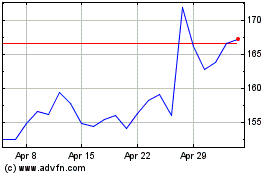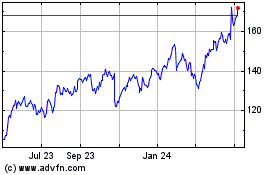Google Chrome to Phase Out Third-Party Cookies -- Update
January 14 2020 - 5:37PM
Dow Jones News
By Bowdeya Tweh and Sahil Patel
Google plans to restrict the use of third-party cookies in its
Chrome internet browser, a move it says is aimed at bolstering
users' privacy while they visit websites.
The Alphabet Inc. unit has been signaling for months that it had
interest in adding more controls on the small data files that help
website operators, and potentially other entities including
advertisers, gain information about visitors. But it has stopped
short of actions taken by Apple Inc.'s Safari and Mozilla Corp.'s
Firefox to roll out broader restrictions on tracking cookies.
As Google takes the step, publishers and advertisers argue the
changes will make the tech giant's own ad business even stronger as
the company will still be able to use data culled from its own
internet-search and other properties to target ads to users.
Separately, a group of state attorneys general and the Justice
Department are probing whether Google, which hauled in $97.24
billion in revenue through three quarters of 2019, engaged in
anticompetitive behavior as it grew to become a dominant presence
in the U.S. ad business.
Google said Tuesday that it would phase out support for
third-party cookies in its browser within the next two years,
according to a blog post by Justin Schuh, director of Chrome
engineering. Third-party cookies, which can be used by ad-tracking
or analytics services, are designed to follow users across the
internet to learn their browsing habits. Those insights can be
valuable to advertisers but have generated consumer privacy
concerns for years.
"First-party" cookies, for example, can be directly collected by
a website through some form of consent or direct relationship with
a user. These types of cookies can be used for purposes such as
saving login information, allowing a user to avoid re-entering a
password at each visit.
Google collects data from users when they browse websites on
Chrome, use its search engine or other products. By using Google's
products, the company can argue that it can track that activity as
first-party data, said Jason Kint, chief executive of Digital
Content Next, a trade association for publishers whose members
include Atlantic Media, Walt Disney Co. and Wall Street Journal
parent Dow Jones & Co.
"Google is defining first-party cookies the way they want to
define it," said Mr. Kint.
Google's two-year phaseout, Mr. Schuh said, is designed to give
users, publishers and advertisers an adjustment period. It will
also provide time for the development of new tools such as a
"privacy sandbox," which would allow users to be served
personalized ads while minimizing advertisers' access to certain
data that makes it easier to identify individuals.
"Users are demanding greater privacy -- including transparency,
choice and control over how their data is used -- and it's clear
the web ecosystem needs to evolve to meet these increasing
demands," Mr. Schuh said in his post. "Some browsers have reacted
to these concerns by blocking third-party cookies, but we believe
this has unintended consequences that can negatively impact both
users and the web ecosystem."
A Google Chrome update to be released next month is designed to
tighten security for third-party cookies before they can no longer
capture data when using the browser.
Google dominates the world-wide browser market, with Chrome
accounting for about 56% of browser usage in December, according to
online statistics service W3Counter. The nearest competitor,
according to W3Counter data, was Apple's Safari browser at 18%.
Google has been slower to adopt and implement anti-tracking
technology within Chrome partially because of its considerable heft
in digital advertising, ad industry representatives say. Google is
the world's biggest ad-seller, and combined with Facebook Inc.
forms the so-called digital ad "duopoly," which takes in more than
60% of digital ad spending in the U.S. alone, according to
eMarketer estimates from last November.
Rival web browsers including Safari and Firefox don't have
advertising businesses to protect, said Mr. Kint. "Google's
business is based on advertising as the customer, and users as the
product," Mr. Kint said. "It has been successful by being able to
take in as much data as possible and not allowing it to leave."
Some advertisers fear that Google's move, as well as other
efforts to remove cookies from web browsers, could result in
millions of wasted dollars invested in data-management platforms,
which marketers have long used to store different sets of audience
data. Vendors that offer ad-retargeting solutions and other
third-party services will also be affected, said Doug Rozen, chief
media officer of ad agency 360i.
Marketers are concerned that Google's move gives it greater
control over audience data while making it more difficult to track
and measure campaigns across different platforms.
"The walled gardens will have higher walls," Mr. Rozen said.
Write to Bowdeya Tweh at Bowdeya.Tweh@wsj.com
(END) Dow Jones Newswires
January 14, 2020 17:22 ET (22:22 GMT)
Copyright (c) 2020 Dow Jones & Company, Inc.
Alphabet (NASDAQ:GOOGL)
Historical Stock Chart
From Mar 2024 to Apr 2024

Alphabet (NASDAQ:GOOGL)
Historical Stock Chart
From Apr 2023 to Apr 2024
